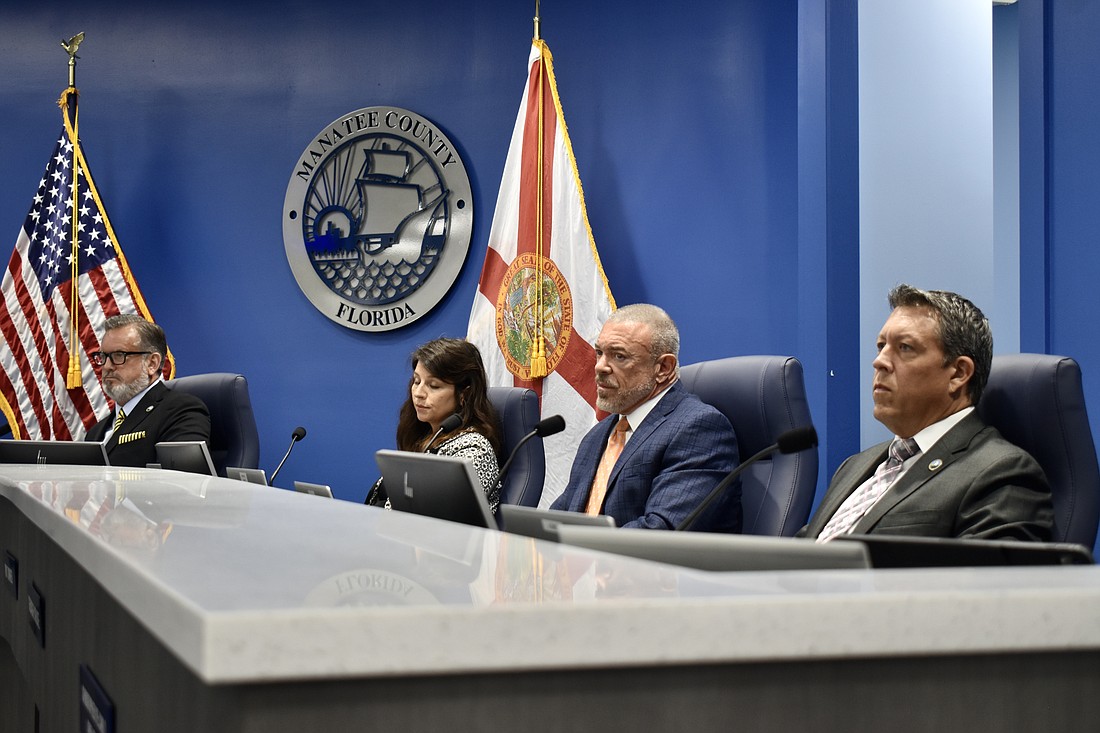- May 14, 2025
-
-
Loading

Loading

Some residents and at least one commissioner continue to request that everyone be allowed to call in to Manatee County Commission meetings and also be allowed to comment via posts on the county's social media platforms.
Commissioner George Kruse started making motions over a year ago that would allow citizens the same opportunity afforded to commissioners — to call in to meetings when they can’t attend in person because of work, child care responsibilities or transportation issues.
Kruse said the board is hearing the same request at every meeting. However, his most recent attempt to change the policy was met with complete silence from the rest of the board.
Outside of Commission Chair Mike Rahn being procedurally obligated to state that the motion had failed for lack of a second, the March 12 commission meeting continued on as if Kruse never made a motion.
Manatee County has no current plans to accommodate call-ins or turn on the comment feature for social media posts.
“My concern was, does this create a hostile work environment,” Rahn said about social media. “There are people out there haranguing certain members of staff consistently.”
He cited examples of staff members’ home addresses being posted, along with what schools their children attend.
The decision to shut off comments at the end of December 2023 was not a board decision, although Rahn said all but one commissioner supports it.
The decision was made by County Administrator Charlie Bishop after he consulted with the county attorney’s office. There’s no law that says the public must be afforded the right to comment on posts or call in to meetings.
Bill Logan, the county’s information outreach manager, said the purpose of the county’s social media pages are to disseminate information, not to provide a public forum.
Kruse is adamant that both issues are a matter of policy, which should not be unilaterally decided by staff but voted on by the board. He said the decision was made improperly and the comments should be turned back on until a motion is made to turn them off.
Resident Andra Griffin called the measures, along with not allowing drinks in the commission chambers, a strategy that is used to prevent people from participating in meetings.
“Everything that’s being put in place is making it uncomfortable for residents to speak up,” Griffin said, “Making it more uncomfortable for them to stay for a duration (of a meeting), making it uncomfortable for them when they can’t stay for the duration. They can’t even call in.”
Rahn said allowing call-ins was “a holdover from COVID” and said it opens up calls to people outside of the county. Advocate groups could organize and hold up commission meetings into the following day.
Public comments during the commission’s decision to reduce wetland buffers lasted two hours.
Each citizen has three minutes to state their case, or 10 minutes if representing an organization. The same rule doesn’t have to apply to callers. Commissioners have the option to set time limits.
Call-ins officially ended, not with a vote, but with an announcement by Commissioner Kevin Van Ostenbridge, who was chair at the time of the December 2022 land use meeting.
“This board previously voted to end all COVID-19 restrictions, but somehow (call-ins) slipped through the cracks,” he said. “If anyone disagrees with that motion, then feel free to make a motion and cast a vote and override my move.”
Once again, commissioners were silent — Kruse included. The only current member of the board who was not seated at the time of the meeting was Commissioner Ray Turner, who was appointed afterward because of Vanessa Baugh's retirement.
The move went relatively unnoticed by citizens during the following January’s meetings. Citizens were preoccupied with a proposal to spend $40,000 to resurrect a confederate statue that was taken down in 2017.
The statue had been removed from the agenda, but several people showed up anyway. Items being added or removed from the agenda after it's been posted has been a bone of contention since.
“When you take off work, you don’t get put back on the schedule,” said Sarah Parker, president of Women's Voices of SW Florida.
Call-ins could help prevent that situation. By February 2023, citizens were requesting call-ins return. In March, Kruse made his first motion to allow call-in comments for 30 minutes per item. That motion was amended to a directive for the county attorney to come back with a procedure for call-in comments.
Only commissioners James Satcher and Kevin Van Ostenbridge were in opposition, but the county attorney never came back with a procedure. Now, all but Kruse are opposed to the idea.
“We’re not removing anybody’s first-amendment right to free speech,” Rahn said. “Come down, you can have all the free speech you want. Write an email, go to 311 or you can come and see me. Reach out to your commissioners.”